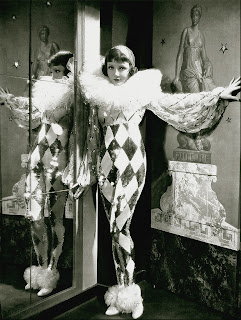 |
| Claudette Colbert, Harlequin |
I read a half dozen articles on the lawsuit brought against Harlequin and became more confused than ever. Then I came across a comment
Laura Resnick made on Joe Konrath's blog and the fog cleared.
Emboldened, I went over to the website the defendants put up to inform the public of the suit and
read the actual complaint. That's what I'd encourage anyone to do who's interested in understanding this thing. The complaint is well written and anyone can understand it with a bit of perseverance.
Since her explanation was the best write up I had come across, I wrote to Laura Resnick and asked her permission to reproduce the comment she left on Joe Konrath's blog post (
Harlequin Fail Part 2), permission which she kindly gave. To put Larua's remarks in context, here is the official response from Harlequin:
TORONTO, July 19, 2012 – Harlequin announced today that they have been made aware of a class action lawsuit brought against them by three former authors.
The publisher wishes to make clear that this is the first it has heard of the proceedings and that a complaint has not yet been served.
“Our authors have been recompensed fairly and properly for their work, and we will be defending ourselves vigorously,” said Donna Hayes, Publisher and Chief Executive Officer of Harlequin. (Harlequin responds to Complaint)
Laura writes:
Yep, they [the defendants] did try to settle. They tried long and hard.
This filing of a legal complaint comes after months of attempts to negotiate with Harlequin via legal counsel, whose fees have been paid by dozens of involved writers (all part of the "class") pooling their financial resources. The writers' legal representation has been trying to reach an agreement with Harlequin since =last year.=
So if Harlequin is "surprised" by the lawsuit, then it was apparently dropped on its head recently, with tragic results. This is much like expressing surprise when you're ticketed after ignoring multiple warnings NOT to park in that no-parking zone where you're trying to park.
Harlequin's Donna Hayes' statement also describes the plaintifss as former Hq writers. Er, NO. They are current, not former. Since Hayes is apparently fuzzy on these concepts, let me explain.
–I- am a FORMER Hq writer; I am –former- because I got all my rights reverted to all books that I ever licensed to Hq, and I have =no= contracts still in effect with them. (That's also why I am not part of the "class" in this lawsuit. I got all my rights reverted before Harlequin launched any sort of digital program, and so my works were never subjected to the egregious fiscal practices specifically described in the complaint.)
By contrast, the plaintiffs named in the lawsuit are authors who have contracts CURRENTLY IN EFFECT with Harlequin, and whose works =are= being subjected to the egregious fiscal practices described in the agreement. As explained in a post yesterday by one of the authors in the class (one who is not a named plaintiff), these writers would be =delighted= to be "FORMER" Harlequin authors—but to make them "former," Harlequin needs to revert their rights to them, rather than retaining their publishing rights in order to contiunue subjecting their intellectual property to these egregious fiscal practices.
But, wait! There's more. The named plaintiffs are not involved in =new= contracts or =new- releases with Hq for obvious reasons: Wriers with -new- contracts and -new- releases fear retaliation from Harlequin for their involvement in this lawsuit, i.e. attempt to be paid fairly by this company, so they don't want to be named. However, though not -named- in the conplaint, many members of the "class" are what even Ms. Hayes, with her flawed understanding of current/former, would presumably describe as "current" Harlequin writers.
If Ms. Hayes assumes only these three writers are involved in the lawsuit, then she has not been paying any attention (which certainly seems to be the case, based on her "surprise") to a YEAR of writers trying to negotiate with Hq over these issues through their legal counsel, -and- she is also presumably unfamiliar with the phrase "class action" lawsuit.
It boggles my mind that Harlequin would feign ignorance of this suit when so many in the industry were aware of it
and that Harlequin would call the defendants
former authors when Harlequin is still selling their books! At least one of Barbara Keiler's ebooks (she was writing as Judith Arnold),
Married To The Man, is (as of July 24, 2012) being sold in Harlequin's online store. [Edit: Before posting this article I checked this link and Barbara's novel seems to have been taken down.]
If Donna Hayes got those two things wrong, why should we think she has any idea whether her authors were, in her words, "recompensed fairly and properly for their work"?
Just in case all that is clear as mud, Laura generously gave me another example of what's behind this lawsuit against Harlequin, and gave me her permission to use it in my blog post. (She used me as an example, I feel like such a star!)
"Let's say I collaborate on a book with Karen. I make a deal to split the proceeds with her for our book 50/50. The way we structure it, I will receive the advances/royalties income directly from the US and foreign publishers or distributors, and then I will distribute Karen's 50% to her.
But then, in the course of handling the contract and money with the publishers (or, for example, with Amazon and Smashwords), I structure my deals with them to pay the advances and royalties directly to a separate business entity called Evil Mastermind, of which I own 100%, rather than to me as an individual.
Over the course of a year, publishers or distributors pay out a total of, say,$20,000 for the book–to “Evil Mastermind, Incorporated.” Evil Mastermind, Inc., then writes me, Laura Resnick, a check for $1,000 for the book.
$1,000 is all that I, Laura Resnick, have received for the book. And since the collaboration contract is between Laura Resnick and Karen (not between Karen and Evil Mastermind), I pay her only $500, i.e. 50% of what I have received as Laura Resnick. Regardless of the fact that $19,000 for that same book is sitting in an account which I own, which funds I can distribute to myself as “dividends, company profits, and salaries,” from a corporation I own and which corporation isn’t mentioned in any profit-sharing contract or agreement that I have with Karen.
This is more or less how the class action suit alleges Harlequin has been handling the author's e-royalty earnings. (But, Hq being a large multi-national corporations with offices in one country, its bank in another, editorial in another, etc., etc., they can presumably do more complicated juggling than one lone blonde Evil Mastermind can.)"
Thanks Laura!
Laura Resnick was the keynote speaker at a Romance Writer's of America convention in my home town a few years ago. Since then I've read and enjoyed her books, she's one of my favorite authors. I can't recommend her work highly enough.
Links list:
Laura's homepage:
LauraResnick.com
- Laura's homepage contains a list of all her work, but don't forget to take a look at the
Esther Diamond books, as well as
The Chronicles of Sirkara. Don't start any of them if you have an important deadline in the next day or two, they are addictive, but in the best of ways. Just don't say you weren't warned!
- Here are a few of
Laura's articles on the business of writing. I cannot recommend these articles highly enough to writers.
Here are a few more truly excellent links Laura Resnick passed along to me, they help explain the current lawsuit against Harlequin.
-
Patricia McLinn's response to Harlequin's pulic statement.
-
The website set up by the "class" to explain the reasons for their lawsuit.
- A lawyer who'll be speaking at RWA National next week gives
a quick four-point analysis of the case (and why Hq, at the moment, appears to
have little room for defending its actions)
Thanks for reading!
Photo credit:
carbonated




